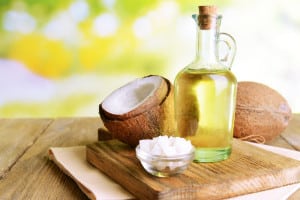
As one of the most versatile, healing oils there is, coconut oil has been used by populations living in tropical parts of the world for thousands of years. Only over the past several decades has it become much more popular in the U.S and Europe, thanks mostly to emerging research that shows it’s one of the easiest fats to metabolize and digest. So what makes coconut oil so special, especially compared to other poplar oils on the market?
What Makes Coconut Oil Stand Out?
The secret lays in its unique chemical composition. It’s often called a “superfood” because it not only provides essential fats, but it’s also capable of fighting bacteria within the body, supporting metabolic functions, helping with hormone production and improving cognitive performance. And let’s not forget it can be used as a natural skin moisturizer, acne fighter, hair conditioner, shaving cream, hair mask, oil-pulling ingredient and even as a natural sunscreen.
Medium Chain Fatty Acids
It all has to do with coconuts’ fatty acids, MCFAs. Coconut oil contains mostly saturated fats, and although this might trigger fear in some people who aren’t aware of the benefits of fats, it’s actually pivotal to its many well-documented health benefits.
Unsaturated long-chain fatty acids (for example the kinds found in nuts, olive oil, or avocados) take longer for the body to breakdown and metabolize, however medium-chain fats are efficiently digested and then provide a source of quick-acting energy. This is why coconut oil is believed to be “burned off” very quickly and to support weight loss in most cases, rather than weight gain. And this is true despite the fact that coconut oil does have a decent amount of calories (the same as other oils, with about 120 calories per tablespoon).
Another interesting fact? For the body to burn through long-chain fats, it must go through a 26 step process (including various enzymes, etc.), but when breaking down medium-chain fats it only go through about 3 steps. This is one reason why coconut oil is very easy to digest, even for people with digestive disorders (like leaky gut syndrome for example). Coconut oil also satiates you quickly and can help kill cravings, since it keeps you full for a long time. It’s also capable of withstanding high-heat cooking temperatures, unlike other oils that easily become rancid including olive, sesame or flaxseed oil.
Coconut Oil Benefits

Finally, one of the major benefits of coconut oil is that it provides anti-bacterial fatty acids called Caprylic acid, Lauric acid, and Capric acid. Research shows around 62 percent of the naturally occurring oils found in coconuts are made up of these 3 healthy fatty acids, and that they naturally help fight the presence of harmful pathogens within the gut. Coconut oil naturally has anti-microbial and anti-fungal properties, which makes it beneficial for healing gut issues, viruses, and bacterial infections including leaky gut syndrome (when the gut becomes permeable and leeches particles into the bloodsteam) or Candida (a virus that commonly causes low energy and sugar cravings). Other benefits include helping to cure Urinary Tract Infections, fungal infections on the skin, healing wounds, clearing up acne, and detoxifying the liver.
Coconut Oil Controversy
If you’ve been in the Paleo world (or basically the general wellness sphere) for any amount of time, you have probably noticed that coconut oil is a favorite oil among health experts.
It has been recommended in cooking, baking, frozen treats, smoothies, for your skin, for your hair, etc. And, as with anything that becomes popular in our society, the memes and parodies followed.
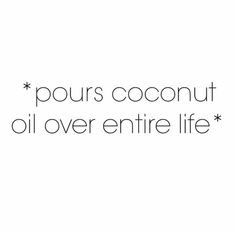
All of that came screeching to a halt last week when the American Heart Association released an article titled “Dietary Fats and Cardiovascular Disease: A Presidential Advisory From the American Heart Association.”
Soon, you had publications like the USA Today sharing the research article with the headline “Coconut oil isn’t healthy. It’s never been healthy.”
As you can imagine, this flipped the health world on its head.
Before we fall into the trap of believing every headline we read on the internet, let’s dive into what the AHA article claims.
A few noteworthy points and recommendations from the AHA article:
“…randomized controlled trials that lowered intake of dietary saturated fat and replaced it with polyunsaturated vegetable oil reduced CVD (cardiovascular disease) by ≈30%…”
“Prospective observational studies in many populations showed that lower intake of saturated fat coupled with higher intake of polyunsaturated and monounsaturated fat is associated with lower rates of CVD…”
“Replacement of saturated with unsaturated fats lowers low-density lipoprotein cholesterol, a cause of atherosclerosis, linking biological evidence with incidence of CVD in populations and in clinical trials.”
“…we conclude strongly that lowering intake of saturated fat and replacing it with unsaturated fats, especially polyunsaturated fats, will lower the incidence of CVD.”
They then go on to recommend that this happens concurrently with adopting either the DASH or Mediterranean diet. They also recommend replacing coconut oil with polyunsaturated fats (essentially vegetable oils) like corn and soybean oils.
The article is 25 pages, and I’d definitely recommend reading through it if you’re curious about the full stance taken by the AHA.
As you can imagine (and maybe you have already read), it didn’t take long for a lot of really well-researched rebuttals to start popping up from doctors and health experts.
I’m going to link and summarize some articles that I’ve found helpful. I hope you do too.
Gary Taubes – VEGETABLE OILS, (FRANCIS) BACON, BING CROSBY, AND THE AMERICAN HEART ASSOCIATION
- Taubes makes the point that the research that the AHA cites in their article falls right in line with what they’ve always recommended (saturated fat is bad – replace it with polyunsaturated fats). He calls this cherry picking – they accentuate the positive research and ignore the research that says otherwise.
- He specifically points out that the AHA claims that only four studies have ever been done with a methodology that allows for a correct assumption to be made about saturated fat and the linkage to cardiovascular disease. Taubes runs through many reasons why this is not the case.
- The four studies that the AHA cites as proof are also decades old. And he points out that the AHA themselves says that it’s too difficult to continue these studies years later.
- Taubes makes the final point that the evidence that the AHA is just not good enough. He ends his argument with, “So even if the AHA hypothesis is as reasonable and compelling as the AHA authors clearly believe it is, it has to be tested. They are literally saying (not figuratively, literally) that vegetable oils — soy, canola, etc — are as beneficial as statins and so we should all consume them. Maybe so, but before we do (or at least before I do), they have a moral and ethical obligation to rigorously test that hypothesis, just as they would if they were advising us all to take a drug. And then, well, they should probably do it twice, since a fundamental tenet of good science is also independent replication. And what we need here is good science.”
Examine.com – 21 of the best arguments for and against coconut oil
- I LOVE this article because it clearly and concisely lays out both sides of the story. If you’ve ever tried to research anything to do with nutrition, you know that you can find research that falls in line with your beliefs or completely rejects it – on the same subject!
- Nutrition is rarely ever black and white. If I stress one thing about nutrition it’s this – EVERY BODY IS DIFFERENT. This article gives you fact-based evidence that researchers have found on coconut oil. Read this article to learn all we know about coconut oil at this time.
- And if you don’t have time to skim through it, I’ll leave you with this snippet: “High coconut oil intakes may increase cardiovascular disease risk, but evidence is conflicting. Observational evidence is positive, trial evidence in humans and animals is mixed. Coconut oil has potentially beneficial MCTs in it, but at lower levels than people think.”
Ali LeVere – In Defense of Coconut Oil: Rebuttal to USA Today
- Polyunsaturated fatty acids (PUFAs) are high in omega-6s. A person’s omega-3 (found in foods like wild-caught fish) to omega-6 ratio determines the body’s inflammatory potential. Increasing consumption of the pro-inflammatory oils the AHA recommends in their study seems irresponsible – especially considering that many of today’s chronic diseases can be linked back to prolonged inflammation due to the standard American diet.
- LeVere makes the argument that dietary cholesterol has been shown to not have the effect it once had on serum cholesterol levels in the body. In fact, low cholesterol levels can be detrimental to a person’s well-being.
- LeVere also links to many studies that have shown the positive impacts that saturated fat can have on a number of health conditions including increasing HDL – the “good” cholesterol.
- Lastly, coconut oil has a number of health-promoting benefits including reducing BMI and waist circumference and has anti-inflammatory, analgesic, antibacterial, and antipyretic properties.
Mark Sisson – Coconut Oil is Going to Kill Us All (Or Maybe Not…)
- You didn’t think I’d leave out our good friend, and Paleo expert, Mark Sisson, did you? Sisson points out that the AHA has long had an agenda against saturated fat consumption and continually cherry pick their data to support their argument.
- He points out that coconut oil has been shown to have favorable health benefits – like raising HDL (the “good” cholesterol), improving cardiometabolic status in patients with heart disease, and can help your skin, hair, and teeth.
- As any great argument does, Sisson also lays out the not-so-great points of coconut oil. He admits it does raise LDL (the “bad” cholesterol) as the AHA claims, but this may not be as concerning because of the positive effects.
- He notes that eating refined coconut oil is NOT the same as eating a whole coconut. Populations that have thrived on coconut (without the presence of heart disease) eat the WHOLE fruit – “flesh, juice, fiber, and all.”
These four articles, in my opinion, lay out some interesting points – as well as being incredibly well-researched.
Should You Eat Coconut Oil?
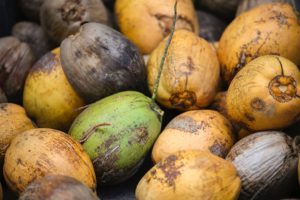
You can make that decision for yourself based on your personal health history and wellness goals. I would definitely recommend getting the whole story on coconut oil first before cutting it out of your diet completely. Read through the original AHA article and understand that the AHA doesn’t have the best track record for recommending unbiased information. Read through the articles that I have linked. Use your mind, critical thinking skills, and best judgment. Be on the lookout for new research and be sure to always check your sources.
Our Favorite Coconut Oil Uses:
Coconut Oil Chocolates
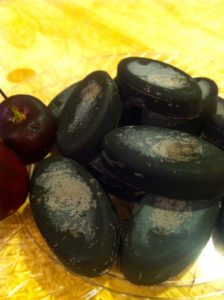
Calories 286 kcal
Ingredients
- 1/2 c Coconut oil
- 1/4 c Unsweetened cocoa powder
- Stevia
Instructions
- Pour 1/2 c coconut oil into a small mixing bowl.
- Using a sieve, add cocoa powder to the coconut oil, and whisk to combine well. The sieve is a very useful tool in this step as it makes sure that the powder blends evenly with the oil.
- Once the coca powder is fully blended into the coconut oil, add a few dashes/drops of liquid or powdered stevia until you reach the desired sweetness. Please note that other sweeteners (such as honey or agave syrup) can be used, but keep in mind that they don’t blend as well with the oil. If you substitute a different sweetener, make sure that you continue whisking throughout the entire process to make sure that the flavors stay blended.
- Pour chocolate mix into small silicone molds or small paper muffin cups.
- Put the molds or cups in the freezer for approximately 15 minutes.
Recipe Notes
Please note that these should be kept in the fridge or freezer. Coconut oil becomes liquid at around 70 degrees F. Variations: Variations to this recipe can be made by adding any of the following to the chocolates once they are in the mold: Orange zest, Almonds, Sea salt, Dried fruit, Coconut shavings.
Coconut Crusted Chicken Salad
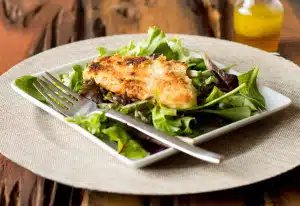
Cook Time 25 minutes
Total Time 25 minutes
Servings 2
Calories 368 kcal
Ingredients
- 2 tbsp Coconut flour
- 2 tbsp Unsweetened flaked coconut
- 2 Chicken fillets
- 1 Egg (beaten)
- 2 cups Spring mix salad greens
- 3 tbsp Apple cider vinegar
- 1 tsp Honey
- 3 tbsp olive oil
- 2 tbsp Coconut oil
- Salt and pepper (to taste)
Instructions
- Create a breading/dredging station with three plates or shallow bowls.
- Add the coconut flour to one, the the egg to the second plate and the flaked coconut to the third.
- Heat the coconut oil in a skillet over medium-high heat.
- Dredge each chicken fillet in the coconut flour first, followed by the egg, coating each evenly. Then the flaked coconut. Be sure the fillet is coated well.
- Place each fillet into the hot skillet. Cook on each side, about 5 minutes. Until the chicken is golden in color and cooked through.
- Add the apple cider vinegar and honey to a bowl. Whisk to combine. Continue to whisk while drizzling in the olive oil until well combined and becomes creamy. Season with salt and pepper.
- Place the spring mix in a mixing bowl. Drizzle the dressing over and toss to coat. Reserve ½ to serving.
- Plate the spring mix evenly then serve the chicken on top. Serve with additional dressing on the side. Season with salt and pepper, to taste.
Coconut Ice Cream Parfait
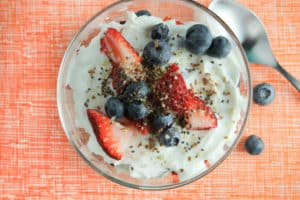
*You will need an ice cream maker for this recipe.
Prep Time 30 minutes
Total Time 30 minutes
Servings 6
Ingredients
Coconut Ice Cream:
- 2 (15 oz) cans full fat coconut milk
- 1/2 cup raw honey or maple syrup
- 3 tablespoons Coconut oil
- 1 tablespoon Vanilla extract
Parfait:
- 4 cups Mixed berries such as strawberries, raspberries, blueberries or blackberries
- 3 tablespoons Ground flax seeds
- 3 tablespoons hemp seeds
- 3 tablespoons Chia seeds
Instructions
- To make the ice cream, put all of the ingredients in a blender and blend until smooth. Transfer mixture to an ice cream maker and following the instructions, churn the mixture until ready to freeze.
- Freeze the mixture overnight.
- To make the parfaits, layer the ice cream with the berries and seeds in tall glasses or bowls.
- Serve immediately.
This is our guide to coconut oil. Check out our other installments:
Which Coconut Oil Should You Buy?